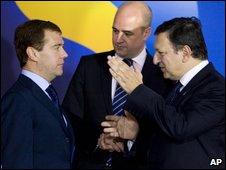Russia eyes EU help for modernisation
- Published

The previous summit took place in Stockholm last November
European Union leaders, overloaded with debt problems in the eurozone economy, are heading to Russia, which, it seems, learnt some lessons from its own recent economic woes.
The EU-Russia summit in Rostov-on-Don in southern Russia at the beginning of next week is expected to focus on strengthening mutual economic and business ties.
Moscow, once reluctant to invite foreign investment, now appears to be more open to closer co-operation with the EU, as its energy-dominated economy is in need of modernisation.
Russian officials' attitudes were changed by the latest global crisis, says Torbjorn Becker, director of the Stockholm Institute of Transition Economics at the Stockholm School of Economics.
Russia's economy shrank by almost 8% in 2009, and while it is forecast to grow by 4% this year, the country faces budget deficits for years to come and has to learn to live without the cushion of oil revenues, which has helped it finance the deficit.
Furthermore, Russia's economic well-being continues to depend heavily on oil prices, which have been falling in recent weeks.
"We have been strengthening our strategic partnership with the European Union and promoting an alliance for modernisation between Russia and the EU," Russian Foreign Minister Sergei Lavrov wrote in an article for Revue Defense Nationale magazine.
European know-how
The EU is by far Russia's biggest economic partner, with business between the two accounting for more than half of Russia's total volume of foreign trade.
Trade between the two had been growing steadily until the second half of 2008, when it was hit by the global crisis.
In the first three months of 2010, the level of trade reached $69bn (£48bn), up by more than 50% from the same period in 2009, as the economies recover from the economic crisis.
Russia supplies about a quarter of the EU's gas needs, with oil and metals being the other main exports.
In turn, Russia imports mainly machinery and transport equipment from European countries.
The two sides have been negotiating a new agreement, The Partnership for Modernisation, aimed at increasing foreign investment, boosting trade and integrating markets.
Russia insists that it is seeking mutual benefits, rather than just gaining access to EU technological know-how that can be used by Russian firms in sectors which must be modernised.
Moscow believes that Europe could, for example, use Russia's knowledge and expertise in space exploration and pharmaceutical projects.
Access to markets
The partnership between Avtovaz, Russia's huge - and troubled - maker of Lada cars, and France's Renault is one of the examples of using European technology to help the Russian economy.
One of Renault's budget models is expected to become the platform to make Lada cars more attractive in comparison with foreign cars assembled at many plants in Russia.
Ksenia Yudaeva, director of the Center for Macroeconomic Research at Sberbank, thinks it would be an over-simplification to say that the only thing Europe needs from Russia is oil and gas, while Russia is interested purely in obtaining know-how.
"European companies open their research centres in Russia, in the fields where they need Russia's engineering knowledge," she says.
Ms Yudaeva also believes that there is a problem in terms of co-operating with the EU in new sectors: "There is low demand in Europe for new products made by unknown firms."
Another problem in the economic relations between Russia and the EU is the existence of trade barriers in many sectors, such as restrictive tariffs on each other's exports.
The situation should change when Russia finally becomes a member of the World Trade Organization.
Moscow has been locked in accession talks for years and hopes to obtain the membership by the end of the year, although it could take longer as Russia, Kazakhstan and Belarus have been trying to create a customs union.
Mr Becker says that becoming a WTO member would make it easier for Russia to gain access to the know-how it needs.
Diversity
So far, the current debt crisis in the eurozone has not affected Russia directly.
However, if the euro economy slows down, it will create economic problems everywhere else.
"It will affect Russia indirectly. Oil prices have already been going down," said Ms Yudaeva.
If demand slows in Europe, it will be an issue for Russia.
Economic Development Minister Elvira Nabiullina has voiced her concerns, saying that, because Russian exports are directed towards the EU market, Russia risks missing out on being present in "the new centres of growth".
"In the next few years, we need to create a competitive export potential and take positions in growing markets. This concerns both traditional energy exports as well as innovation products," the minister said.
However, even if Russia does seek out new markets, the EU is still expected to remain a key market.
Mr Becker says that "as Europe is thinking about diversifying energy supplies, it is only natural that Russia is thinking about diversifying energy demand".
From January to the end of March, Russia's trade with China amounted to 9% of the overall volume of the Russian foreign trade, less than the Netherlands' share of 10% and a bit more than Germany's 8.3%.
Mr Becker also points out that Russia could even benefit from the crisis in the eurozone, by getting opportunities to buy new assets there.
"Russia, being really pragmatic, can capitalise on troubles in Europe," he says.
For more about business in Rostov-on-Don and the Russian economy, watch Russia Business Report on BBC World News this weekend: on Saturday, 29 May at 0430 GMT and 1730 GMT and on Sunday, 30 May at 1030 GMT and 2330 GMT.